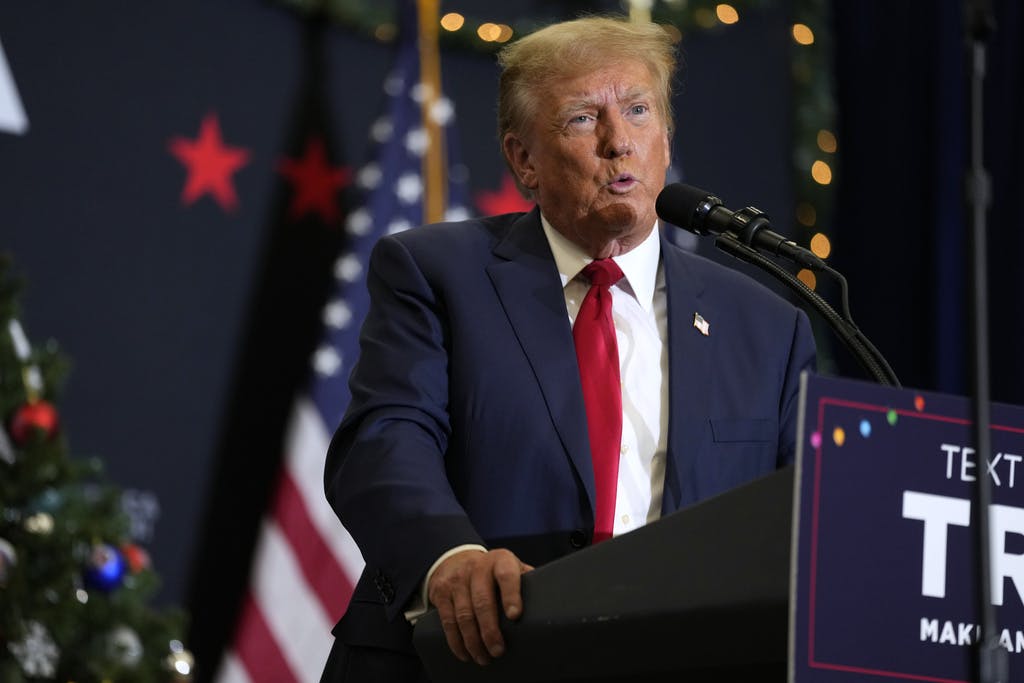Trump, in Phone Call, Pressured Michigan Officials Not To Certify 2020 Vote: Recording
The former president’s 2024 campaign neither confirms nor denies the recording’s legitimacy, insisting in a statement that all of Mr. Trump’s actions after the election were taken to uphold his oath of office and ensure fair voting.

President Trump pressured two election officials not to certify 2020 vote totals at a key Michigan county, according to a recording of a post-election phone call disclosed in a new report by the Detroit News.
The former president’s 2024 campaign neither confirmed nor denied the recording’s legitimacy, insisting in a statement that all of Mr. Trump’s actions after the election were taken to uphold his oath of office and ensure fair voting.
Despite Mr. Trump’s claims about the 2020 election, no evidence has emerged in a litany of federal, state, and outside investigations of voter fraud that could have changed the outcome of the election.
The November 17, 2020, telephone call included Mr. Trump; the Republican National Committee chairwoman, Ronna McDaniel; and Wayne County elections authorities Monica Palmer and William Hartmann, who are both Republicans, the Detroit News reported.
Mr. Trump told the two canvassers that they would look “terrible” should they certify results after having initially opposed certification, the newspaper said. The two ultimately issued signed affidavits asserting their opposition to certifying Wayne County’s results.

The newspaper said the recordings were made by a person who was present for the call with Ms. Palmer and Mr. Hartmann.
The report comes as Mr. Trump seeks the 2024 Republican nomination while grappling with multiple criminal indictments, including a federal case and a Georgia case tied to his efforts to overturn President Biden’s election victory.
As he campaigns for a return to the White House, Mr. Trump continues to repeat the lies that the 2020 election was stolen, despite multiple recounts and court cases confirming his defeat.
Mr. Biden won Michigan, with Wayne County, which includes Detroit, providing a trove of Democratic votes. As such, it was one of the key places Mr. Trump focused on in the weeks after Election Day in 2020.
“We’ve got to fight for our country,” Mr. Trump said on the recordings, according to the News. “We can’t let these people take our country away from us.”
Ms. McDaniel, a Michigan native, reportedly said during the call: “If you can go home tonight, do not sign it,” adding, “We will get you attorneys.”
Mr. Trump is said to have reinforced the point, assuring the local officials: “We’ll take care of that.”
A spokesman for Mr. Trump, Steven Cheung, said in a statement Friday that Mr. Trump’s actions were “taken in furtherance of his duty as President of the United States to faithfully take care of the laws and ensure election integrity.”
“President Trump and the American people have the Constitutional right to free and fair elections,” Mr. Cheung said.
The Republican National Committee’s communications office did not immediately respond Friday to a request for comment from Ms. McDaniel.
The new disclosure appears to add details to communications with local officials referenced in the January 6 committee’s final report on Mr. Trump’s actions after the 2020 election and leading up to the January 6, 2021, Capitol riot by Mr. Trump’s supporters on the day that Congress convened to ratify the Electoral College results.
That congressional report states that Mr. Trump and Ms. McDaniel called Ms. Palmer and Mr. Hartmann “about 20 minutes after” the two officials had changed their initial votes and agreed to certify the results.
“The Select Committee doesn’t know what President Trump privately said on that phone call,” the report states. The committee states that Mr. Hartmann, at the time of the congressional inquiry, said that he was not pressured in a conversation he described as involving “general comments about different states.”
Yet the January 6 committee emphasized Ms. Palmer and Mr. Hartmann’s decision, made after Mr. Trump’s call, to issue the signed affidavits reasserting their original opposition to certification.
The Michigan call would have occurred about six weeks before another call Mr. Trump made to Georgia’s secretary of state, Brad Raffensperger. That conversation is among the key points in Mr. Trump’s indictment at Fulton County that accuses the former president of a racketeering scheme to overturn Mr. Biden’s narrow victory in Georgia.
“I just want to find 11,780 votes, which is one more than we have,” Mr. Trump told Mr. Raffensperger in that call. “Because we won the state.”
Georgia counted its votes three times before certifying Mr. Biden’s win by a 11,779-vote margin.
A recording of Mr. Trump is also at issue in a Florida-based federal case accusing the former president of mishandling classified information after leaving the White House.
In that case, prosecutors allege that in a July 2021 interview, Mr. Trump showed people, who were working on a book about his former chief of staff Mark Meadows, classified information about a Pentagon plan of attack on an unspecified foreign country.
“These are the papers,” Mr. Trump says in a moment that seems to indicate he’s holding a secret Pentagon document. “This was done by the military, given to me.”
